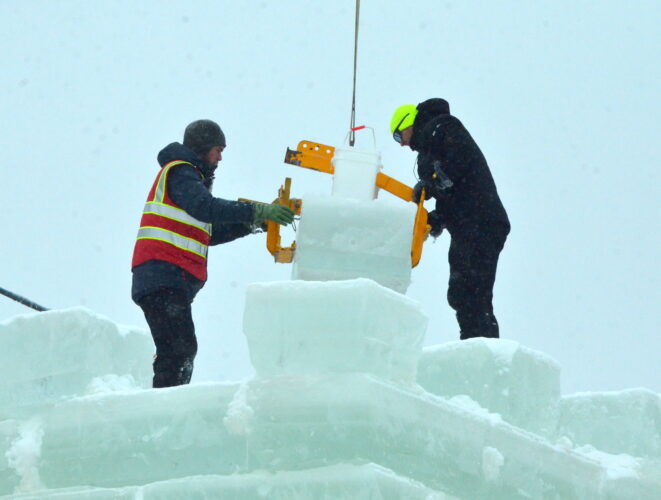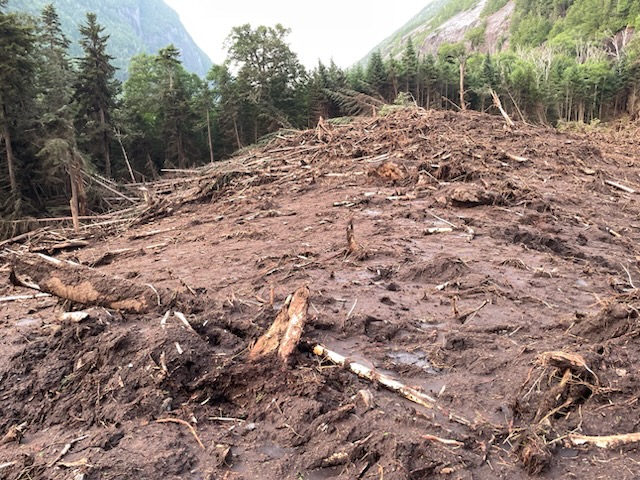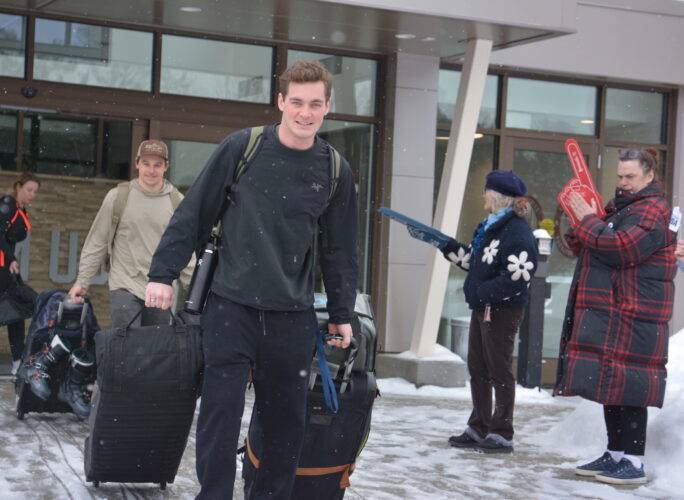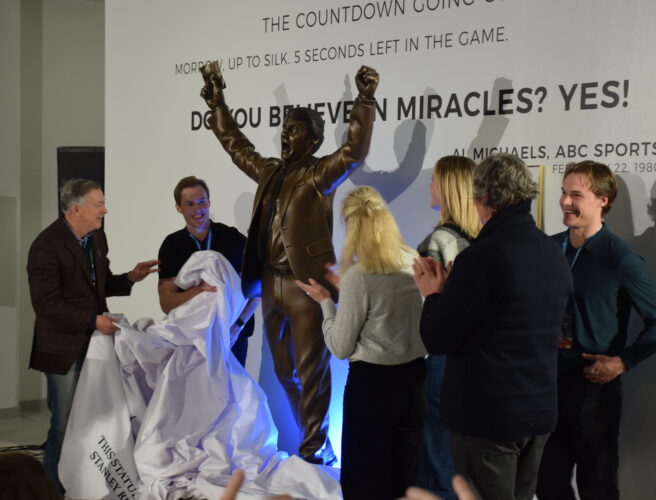Mirror Lake’s deep clean
Mirror Lake Watershed Association holds annual cleanup
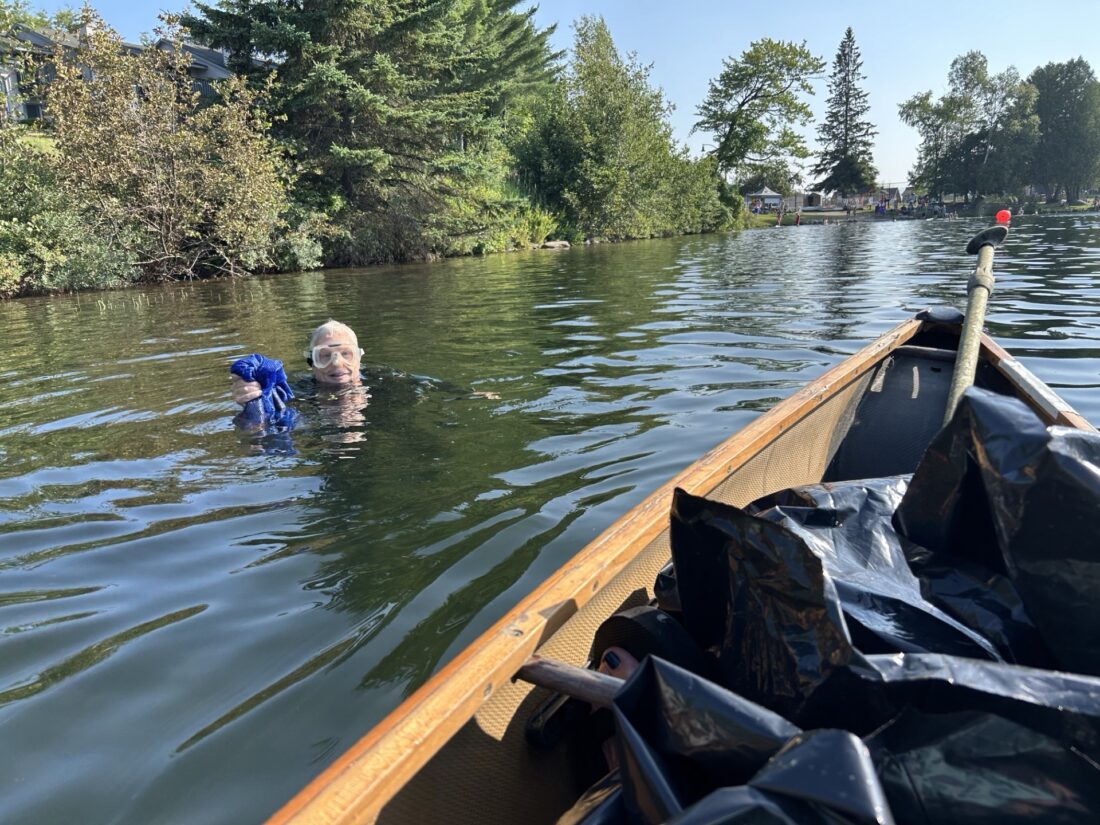
Jim Grant surfaces in Mirror Lake on Monday, July 28, holding a bag of garbage. Grant volunteered his services as a scuba diver to assist the Mirror Lake Watershed Association with its lake cleanup, recovering litter that had sunken to the lakebed, which was handed off to MLWA volunteers who ferried to shore in their boats. (Provided photo — Sandy Edgerton Bissell)
LAKE PLACID — Sunny skies and temperatures well into the 80s meant that Mirror Lake was a busy scene on Monday, July 28.
In the midst of the hundreds of swimmers, boaters and beach-goers enjoying their afternoon on the water, a dedicated group of volunteers was making their way around the lake — on shore, in boats and even underwater. They spent several hours removing garbage around the shoreline and underwater to keep Mirror Lake looking clean.
Organized by the Mirror Lake Watershed Association, the cleanup was buoyed by Jim Grant, who volunteered his skills and time as a scuba diver to bring up garbage from the lake’s floor that would have otherwise been unrecoverable. MLWA board members and volunteers then ferried Grant’s recoveries to land, where others — who were simultaneously picking up debris along the shore — bagged it up to be disposed of responsibly.
“With the help of dedicated volunteers like Jim Grant, we’re able to remove debris from the lakebed and preserve this natural resource for wildlife, recreation and future generations,” MLWA Chair Marcy Fagan said.
Grant has been volunteering with the cleanups for more than 30 years. He credited Brian and Karen Delaney, as well as Dick and Denise Erenstone as being among the first residents back then to kickstart the initiative.
“I am in the water swimming everyday, I do a lot of scuba diving,” Grant said. “It’s a great natural resource that we have and if I can do my part to help keep it healthy, I’m very happy to do so.”
Since its inception, Grant estimates that he has brought up at least several thousand individual items of garbage — everything from the mundane, such as bottles and cans, to the extraordinary, such as a recreational drone whose footage was able to be recovered. That story is available at tinyurl.com/yuf849ed.
Monday’s cleanup focused on the southern area of the lake, from the shore near the public tennis courts to the vicinity of the Lake Placid Club Boat House Residences. Grant said that area sees the most visitors and its proximate location to Mirror Lake Drive and its sidewalk means that’s where the highest concentration of shoreline and underwater garbage accumulates.
Grant was able to clean up as deep as 17 feet. He said that’s where the thermocline was — a thin layer of water where the temperature changes rapidly. In this case, Grant said the layer was sudden, only about 1 foot deep. Above it, the water temperature was around 72 degrees Fahrenheit and below it, the temperature plunged to the upper 50s. Not wearing a scuba hood, Grant said he was not in a position to safely enter the colder water then.
This cleanup’s underwater finds included boards and part of a concrete pipe used in construction, a paddle, fish hooks, plastic litter, bottles, cans, t-shirts and lots of unrecognizable stuff covered in silt. While above-surface items included fishing line, more hooks and tackle, more plastic cups and tops, and other various pieces of trash, according to MLWA Board Member Sandy Edgerton Bissell, who ferried items that Grant brought up to shore. It amounted to several full contractor bags of garbage.
“I think (Monday) was just really a bit of just of run-of-the-mill trash, and it’s always great to get that stuff out,” he said. “People come to the area and it’s a pristine lake above and we want to keep it as clean as possible below as well.”
A few of the in-tact items were able to be recovered and put back into use. This included a High Peaks Cyclery buoy that had been placed on the lake to help mark the swim course. Grant said the buoy was sunken but, aside from being flooded with water, was not damaged. He suspected that it was a case of summer mischief, with kids thinking it’d be a funny prank one night to deflate it.
Fortunately, Grant and the volunteers were able to get it back to shore just as High Peaks Cyclery staff was setting up for its weekly Mini-Tri Series, which all begin at Mirror Lake’s southeastern shore Monday evenings through Aug. 11.
“It’s neutral buoyancy underwater, so it was really easy for me to bring it up,” Grant said. “But it was hard for all the other volunteers to drag it because, on land, the thing probably weighed a couple hundred pounds.”
Over the years, Grant has seen a promising trend: there have fewer and fewer “major hauls” in recent years compared to when started. He attributed that to campaigns that have increased awareness about protecting Mirror Lake, and said people have begun to realize that leaving garbage “out of sight,” at the bottom of the lake is just as damaging, if not more so, to the lake’s vitality than littering the shoreline.
Spearheading the awareness campaign, the MLWA has placed and maintained signage around the lake’s busy spots reminding those who come to enjoy the lake that it’s everyone’s responsibility to keep things clean, among other ecologically-prudent measures such as not feeding ducks. While that’s often done with innocent intentions, the signs advise that ducks can become sick or injured as a result of the harmful nutritional impacts that come with eating human food that’s far afield from their natural diets.
For the past six years, the MLWA has also been contracting with Paul Smith’s College’s Adirondack Watershed Institute to hire lake stewards to inspect the bottoms of visiting watercraft before they enter Mirror Lake.
That’s done to intercept any invasive aquatic species that often “hitch a ride” on watercraft to spread from lake to lake.
The trained stewards also help to answer any questions about the Lake or Lake Placid that people may have, while educating the public about the importance of cleaning, draining and drying watercraft between waterbodies to mitigate the invasives’ spread. On Monday, July 28 AWI steward Erik Van Yserloo reported that over over 100 watercraft had been inspected just that day before the MLWA’s cleanup began at 4 p.m. — demonstrating that keeping the lake clean and protected requires an around-the-clock effort.
To learn more about “clean, drain and dry” and its importance visit tinyurl.com/4cmdn33p. More information on the MLWA is available on its website, mirrorlake.net.


